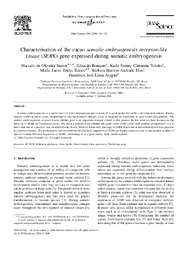Characterization of the cacao somatic embryogenesis receptor-like kinase (SERK) gene expressed during somatic embryogenesis.
Characterization of the cacao somatic embryogenesis receptor-like kinase (SERK) gene expressed during somatic embryogenesis.
Autoria: SANTOS, M. de O.; ROMANO, E.; YOTOKO, K. S. C.; TINOCO, M. L. P.; DIAS, B. B. A.; ARAGÃO, F. J. L.
Resumo: Somatic embryogenesis is a useful tool for plant propagation and consists of a good model for embryo development studies. During somatic embryogenesis, some morphological and biochemical changes occur in response to alterations in gene expression patterns. The somatic embryogenesis receptor kinase (SERK) gene is an important element related to this process. In this work we have focused on the function of SERK in Theobroma cacao. Our main questions were whether this gene exists in this plant with another arrangement; if it is functional and, in a positive case, in which tissues it acts. We have found only one copy of SERK that is functional and analyzed its expression in a series of tissues. The phylogenetic tree showed that the available sequences of SERK are highly conserved and a considerable number of species contain different sequences of SERK, confirming it as a gene family with variant repeats.
Ano de publicação: 2005
Tipo de publicação: Artigo de periódico
Palavras-chave: Clonagem de genes, Expressão gênica, Família gênica, Filogenia molecular, RT-PCR, Thebroma cacao
Observações
1 - Por padrão são exibidas publicações dos últimos 20 anos. Para encontrar publicações mais antigas, configure o filtro ano de publicação, colocando o ano a partir do qual você deseja encontrar publicações. O filtro está na coluna da esquerda na busca acima.
2 - Para ler algumas publicações da Embrapa (apenas as que estão em formato ePub), é necessário ter, no celular ou computador, um desses softwares gratuitos. Sistemas Android: Google Play Livros; IOS: iBooks; Windows e Linux: software Calibre.
Acesse outras publicações
Acesse a Base de Dados da Pesquisa Agropecuária (BDPA) para consultar o acervo completo das bibliotecas da Embrapa.

